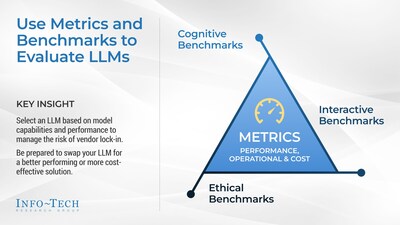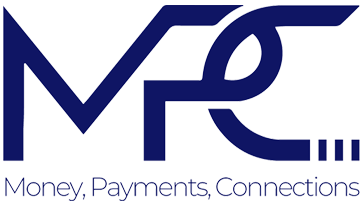Optimizing AI for Service Providers: Info-Tech Research Group Details the Importance of Strategic LLM Selection
A new resource from Info-Tech Research Group offers a strategic framework for evaluating large language models (LLMs) in the service providers industry based on cognitive, interactive, and ethical benchmarks. By equipping IT leaders with the tools to balance functionality, cost, and ethical considerations, the firm’s blueprint will help mitigate risks such as vendor lock-in and hidden costs to foster more informed decision-making and drive innovation within the industry.
TORONTO, Oct. 11, 2024 /CNW/ – As managed service providers (MSPs) and technology firms evolve to meet new challenges in AI adoption, selecting the right large language model (LLM) has become increasingly complex. Info-Tech Research Group addresses these challenges with its newly published blueprint, Leverage Metrics and Benchmarks to Evaluate LLMs. This research-backed resource equips executives, including CIOs transitioning to CTO roles and senior leaders in operations and quality assurance, with a strategic framework and essential tools for evaluating large language models (LLMs). By using specific metrics and benchmarks, the resource ensures that the selection process aligns with their unique needs and business objectives.

“The AI services industry is quickly entering a period of LLM commoditization. Businesses will soon face challenges in not only adopting generative AI technology but also navigating an evolving marketplace where the most performant and cost-effective option is not obvious,” says Justin St-Maurice, principal research director at Info-Tech Research Group. “While ChatGPT is a serious contender and a disruptor, it should not be a default product choice. Nor should OpenAI be a single go-to vendor.”
In its resource, Info-Tech outlines the significant challenges service providers encounter when selecting the right LLM from a wide range of options. Each LLM offers distinct functionalities and unique value propositions, adding layers of complexity to the evaluation process. Furthermore, the firm advises that as major providers seek to recoup their investments, hidden costs associated with operating LLMs are emerging, raising concerns about vendor lock-in and escalating expenses. The difficulty in translating LLM benchmarks into practical performance metrics can further complicate the task of identifying the most suitable model for specific organizational needs.
“Navigating this evolving landscape in LLM selection requires a partnership between business and technology leaders,” explains St-Maurice. “Technologists will need to work with the business to buy, customize, or build models that address specific gaps and deliver specific value, all while balancing and optimizing tangible costs and measurable efficiencies against specific performance requirements.”
The firm’s blueprint further emphasizes the importance of selecting LLMs based on their capabilities and performance, especially for IT leaders in the service provider industry. This approach not only helps mitigate the risk of vendor lock-in but also ensures that organizations find the right balance between cost and performance, which is crucial for long-term success.
In Leverage Metrics and Benchmarks to Evaluate LLMs, Info-Tech recommends that technology leaders evaluate LLMs using the following key metrics and benchmarks:
- Cognitive Benchmarks: Assess the model’s reasoning, comprehension, and problem-solving skills as well as its ability to apply knowledge in various contexts. This approach helps ensure that the LLM can handle complex tasks and adapt to a wide range of scenarios.
- Interactive Benchmarks: Evaluate how effectively the model engages in dialogue, follows instructions, and maintains contextual understanding across interactions. This method is crucial for delivering an intuitive, seamless experience for end users, especially in service-oriented environments.
- Ethical Benchmarks: Examine the model’s fairness, safety, and ability to detect bias. The LLM should adhere to ethical guidelines and responsible AI principles, ensuring it operates in a transparent and secure way.
Info-Tech’s insights and advisory for IT leaders in the service provider industry provides actionable tools to navigate the increasingly complex AI landscape. By leveraging the firm’s solution library within the newly published blueprint, IT leaders can explore innovative concepts and applications of LLM technology, driving both operational efficiency and creative innovation.
For exclusive and timely commentary from Justin St-Maurice, an expert in technology services, and access to the complete Leverage Metrics and Benchmarks to Evaluate LLMs blueprint, please contact pr@infotech.com.
About Info-Tech Research Group
Info-Tech Research Group is one of the world’s leading research and advisory firms, proudly serving over 30,000 IT and HR professionals. The company produces unbiased, highly relevant research and provides advisory services to help leaders make strategic, timely, and well-informed decisions. For nearly 30 years, Info-Tech has partnered closely with teams to provide them with everything they need, from actionable tools to analyst guidance, ensuring they deliver measurable results for their organizations.
To learn more about Info-Tech’s divisions, visit McLean & Company for HR research and advisory services and SoftwareReviews for software buying insights.
Media professionals can register for unrestricted access to research across IT, HR, and software and hundreds of industry analysts through the firm’s Media Insiders program. To gain access, contact pr@infotech.com.
For information about Info-Tech Research Group or to access the latest research, visit infotech.com and connect via LinkedIn and X.
SOURCE Info-Tech Research Group
Media Contact: Sufyan Al-Hassan, Senior PR Manager, Info-Tech Research Group, salhassan@infotech.com | +1 (888) 670-8889 x2418







